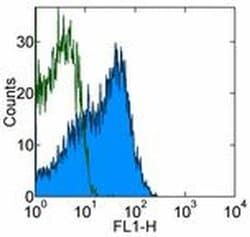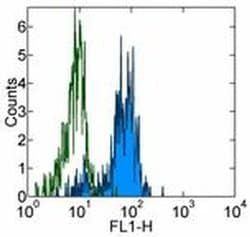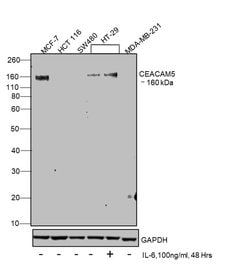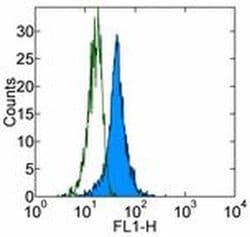CD62P (P-Selectin) Monoclonal Antibody (AK-4), eBioscience™, Invitrogen™
Manufacturer: Invitrogen
Select a Size
| Pack Size | SKU | Availability | Price |
|---|---|---|---|
| Each of 1 | 50-126-76-Each-of-1 | In Stock | ₹ 11,214.00 |
50-126-76 - Each of 1
In Stock
Quantity
1
Base Price: ₹ 11,214.00
GST (18%): ₹ 2,018.52
Total Price: ₹ 13,232.52
Antigen
CD62P (P-Selectin)
Classification
Monoclonal
Concentration
0.5 mg/mL
Formulation
PBS with 0.09% sodium azide; pH 7.2
Gene Accession No.
P16109
Gene Symbols
SELP
Purification Method
Affinity chromatography
Regulatory Status
RUO
Gene ID (Entrez)
6403
Content And Storage
4° C
Form
Liquid
Applications
Flow Cytometry, Functional Assay, Immunocytochemistry, Immunohistochemistry (Frozen), Neutralization
Clone
AK-4
Conjugate
Unconjugated
Gene
SELP
Gene Alias
CD62; CD62 antigen-like family member P; CD62P; CD62P antigen; CD62P; CD62 homolog; FLJ45155; GMP140; GMP-140; GMRP; Granule membrane protein 140; granule membrane protein 140kDa; granulocyte membrane protein; Grmp; LECAM3; leukocyte-endothelial cell adhesion molecule 3; PADGEM; Platelet activation dependent granule-external membrane protein; platelet alpha-granule membrane protein; PSEL; PSELECT; P-selectin; P-selectin precursor; RP1-86F14.2; selectin P; selectin P (granule membrane protein 140kDa, antigen CD62); selectin, platelet; Selp
Host Species
Mouse
Quantity
100 μg
Primary or Secondary
Primary
Target Species
Human
Product Type
Antibody
Isotype
IgG1 κ
Description
- Description: The AK-4 monoclonal antibody reacts with human CD62P, a 140 kDa transmembrane glycoprotein also known as P-Selectin
- Upon activation, CD62P is rapidly transported from its cytoplasmic stores in the Weibel-Palade bodies of endothelial cells or the alpha-granules of platelets to the surface
- CD62P initiates the adhesive interaction between endothelial cells and neutrophils and monocytes during the inflammatory reaction and is also involved in the interaction of platelets with monocytes and neutrophils
- Applications Reported: The AK-4 antibody has been reported for use in flow cytometric analysis, and immunohistochemical staining of frozen tissue sections
- AK-4 has also been reported in blocking adhesion of platelets in in vitro assays
- Applications Tested: This AK-4 antibody has been tested by flow cytometric analysis of resting and thrombin-activated human platelets
- This can be used at less than or equal to 1 μg per test
- A test is defined as the amount (μg) of antibody that will stain a cell sample in a final volume of 100 μL
- Cell number should be determined empirically but can range from 10^5 to 10^8 cells/test
- It is recommended that the antibody be carefully titrated for optimal performance in the assay of interest
- Purity: Greater than 90%, as determined by SDS-PAGE
- Aggregation: Less than 10%, as determined by HPLC
- Filtration: 0.2 μm post-manufacturing filtered
- P-selectin (Selectin P, GMP-140, LECAM3, CD62 antigen-like family member) is a 140 kDa type 1 transmembrane glycoprotein, and is one of the most commonly studied proteins that regulate cell rolling
- P-selectin is stored in the Weibel-Palade bodies of endothelial cells, as well as in a-granules of platelets
- From there, it can be rapidly brought to the cell surface after exposure to thrombin, histamine, complement 5a, Ca21 ionophores, or adenosine diphosphate
- P-selectin protein redistributes to the plasma membrane during platelet activation and degranulation and mediates the interaction of activated endothelial cells or platelets with leukocytes
- P-selectin plays an important role in adhesive processes between leucocytes and endothelial cells, and is a calcium dependent receptor that binds to sialylated forms of Lewis blood group carbohydrate antigens found on neutrophils and monocytes
- P-selectin is constitutively expressed in inflammation and contributes to atherogenesis, thrombosis and tissue destruction
- Clinically, P-selectin is used to distinguish heparin induced thrombocytopenia with and without thrombosis.



